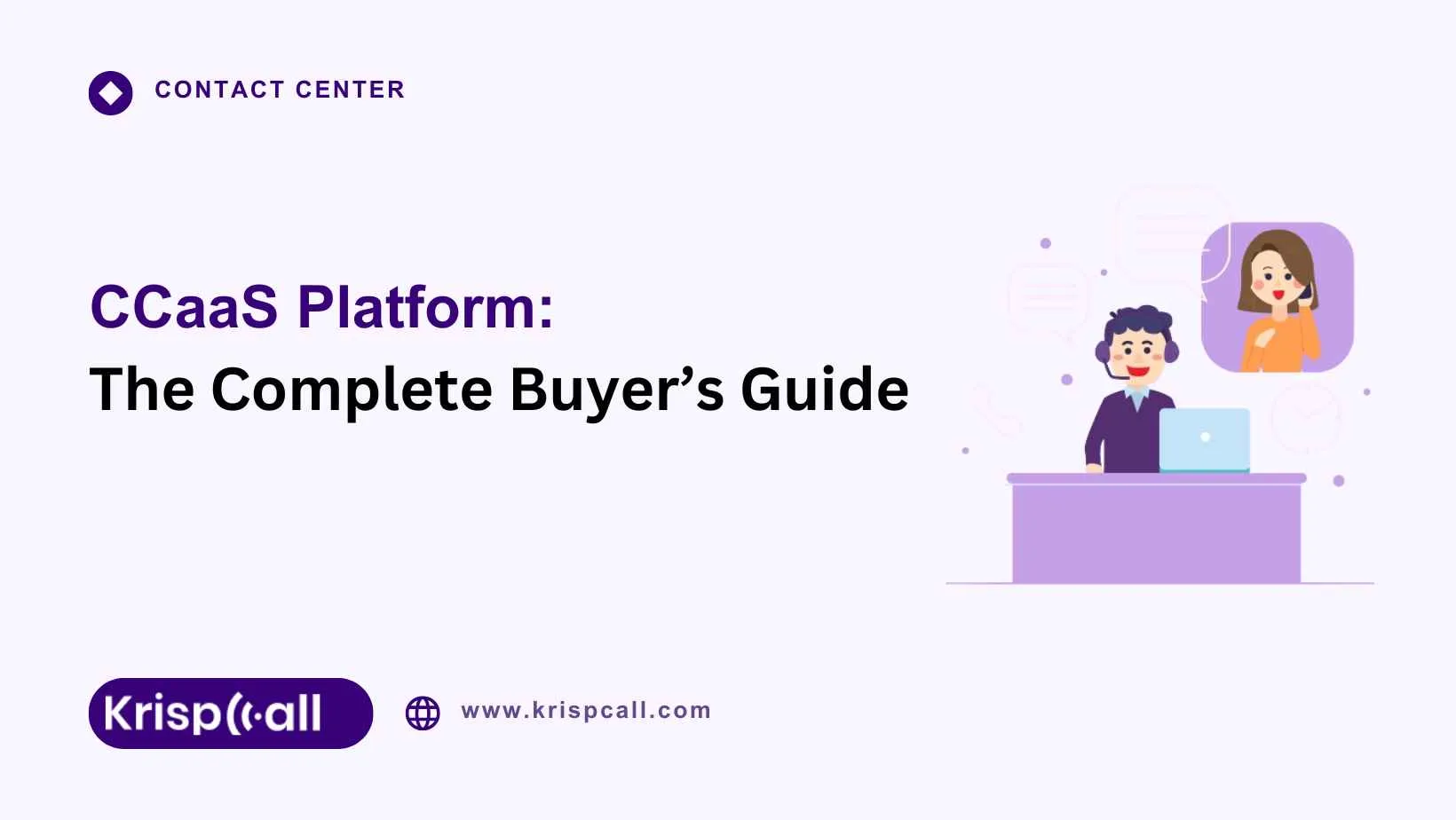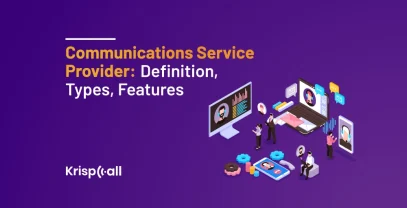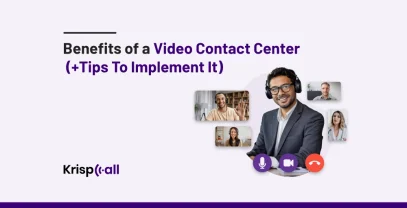The role of customer service and communication has changed significantly. Contact Center as a Service (CCaaS) platforms have emerged as essential tools for businesses looking to provide great customer experiences. 💫
However, selecting the right CCaaS platform may be difficult with so many alternatives on the market. This buyer’s guide provides comprehensive insights into the key factors to consider when evaluating and selecting a CCaaS platform for your business needs.
Whether you’re a small startup or a large enterprise, investing in a CCaaS solution requires careful analysis and consideration.
In this guide, you will learn about CCaaS platforms, the essential features of contact centers that businesses should know, and the best business tips for buying a CCaaS platform.😀
🗝️Key Highlights
- A Contact Center as a Service (CCaaS) is a cloud-based solution for managing customer interactions efficiently.
- Businesses should know the essential CCaaS features, including Interactive Voice Response (IVR), Call Routing, Real-time Call Analytics, Automated Workflows, Call Queuing, Omnichannel Communication, and more.
- Prioritize platforms with robust analytics to improve decision-making and optimize customer service strategies.
- Choose a supplier with a solid track record for reliability, support, and innovative solutions that align with your business needs.
- KrispCall is recognized as a top-tier CCaaS platform in today’s market.
Let’s get started.🚀
What is a contact center as a service (CCaaS) ?
A Contact center as a service (CCaaS) is a cloud-based contact center solution that provides businesses with the tools and infrastructure to manage customer interactions efficiently. It helps agents to communicate with clients across several channels, such as phone calls, chat, text messaging, and social media.
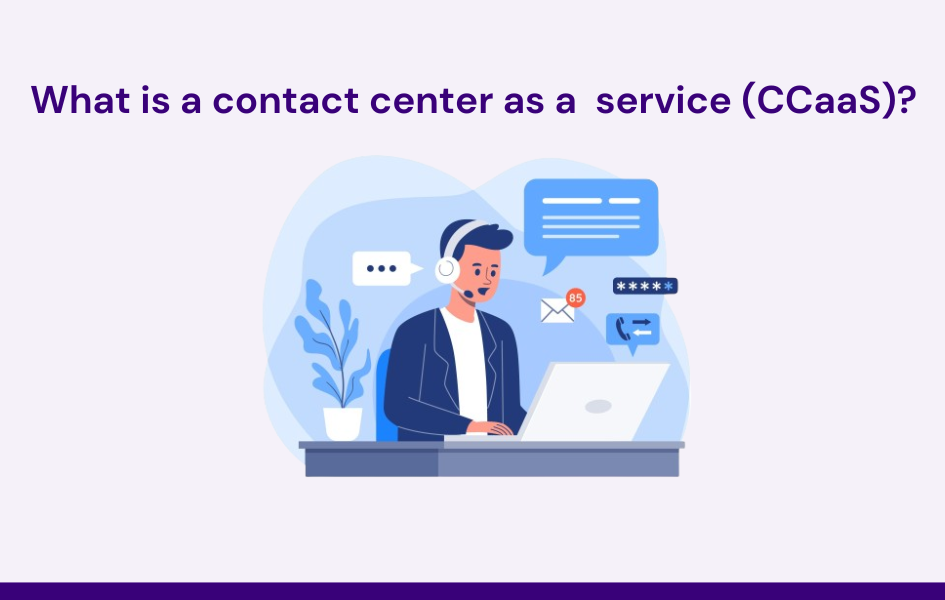
CCaaS software allows businesses to create a scalable strategy to manage inbound and outgoing communications across all channels while lowering hardware, phone, and IT costs. Contact centers are ideal for handling frequent client queries, orders, and help desk issues.
Choosing the best CCaaS platform for your business might take some time, as it requires extensive research and consideration.
What are the essential CCaaS features businesses should know?
Here are the essential CCaaS features businesses should know about:
- Interactive voice response (IVR): Allows callers to interact with an automated system using voice or keypad inputs to route calls or gather information.
- Call routing: Directs incoming calls to the most appropriate agent or department based on predefined rules or criteria.
- Real-time call analytics: Provides insights into call metrics and performance in real-time. It enables businesses to make data-driven decisions and optimize operations.
- Automated workflows: Streamlines processes by automating repetitive tasks and guiding agents through predefined steps, improving efficiency and consistency.
- Call queuing: Manages incoming calls during peak times by placing them in a queue and routing them to available agents as soon as possible.
- Omnichannel communication: Supports communication across multiple channels such as voice, email, chat, and social media, ensuring a seamless customer experience.
- Automatic call distribution (ACD): Distributes incoming calls evenly among agents based on availability, skills, or other criteria to minimize wait times and improve customer satisfaction.
- Workforce management: Helps businesses optimize staffing levels, schedules, and resources to meet customer demand efficiently while balancing agent productivity and well-being.
- CRM integration: Integrates with Customer Relationship Management (CRM) systems to access customer data, history, and preferences. It enhances personalized interactions and service delivery.
- Call coaching: Provides tools and feedback mechanisms for supervisors to coach and train agents in real-time or based on recorded interactions.
10 Effective tips when choosing a CCaaS platform for business
When buying a CCaaS (customer contact as a service) platform, consider these ten business tips to make an informed decision:
1. Define your requirements
The first and most crucial stage in obtaining a cloud-based contact center solution is evaluating your company’s and customer’s demands.
It involves studying shifts in consumer preferences, needs, and purchasing patterns, as well as understanding the barriers to providing excellent service to customers.
You need to clearly outline your business needs, such as the volume of customer interactions, preferred communication channels (phone, email, chat), integration with existing systems (CRM, ERP), scalability requirements, and budget constraints.
2. Evaluate CCaaS features
Once you have clearly identified your business needs, create a comprehensive list of the specific Contact Center as a Service (CCaaS) features that align with your requirements.
You should consider essential features such as IVR (Interactive Voice Response), call routing, real-time call analytics, automated workflows, call queuing, omnichannel communication, automatic call distribution, and CRM integration. You can assess how these features align with your operational goals.
3. Scalability
Scalability is a critical consideration when selecting a CCaaS platform, as it directly influences your capacity to manage fluctuations in call volume and integrate new communication channels smoothly.
A scalable platform should offer elasticity that allows you to dynamically adjust resources in response to demand spikes without compromising performance.
CCaaS solutions should empower agents to operate seamlessly across various time zones and on multiple devices, including phones, laptops, and tablets. This flexibility enhances team efficiency and optimizes their productivity and responsiveness to customer needs.
4. Security and compliance
You must select CCaaS platforms that offer robust security measures to protect customer data. If applicable to your business, you should check for compliance with industry regulations such as Health Insurance Portability and Accountability Act (HIPAA), General Data Protection Regulation (GDPR), or Payment Card Industry (PCI).
Verify the provider’s security audits, certifications, and incident response procedures. Also, ensure secure integrations, implement data privacy measures, and have options for compliant data storage.
It is essential for the CCaaS platform to include features such as anti-virus scanning and mitigation, multifactor authentication, data encryption, biometrics identification, and powerful network access control to strengthen cyber defense.
5. User experience
When considering user experience (UX) in the context of buying a CCaaS platform, you’re looking at how intuitive, efficient, and satisfying the platform is for both your agents and customers. This includes aspects like ease of navigation, clarity of interface design, responsiveness of features, and overall usability.
A good UX design can improve productivity, reduce training time for agents, enhance customer satisfaction, and ultimately contribute to the success of your customer contact operations.
6. Guarantee an easy setup
When purchasing a CCaaS (Customer Contact as a Service) platform, ensuring easy implementation is vital for a smooth transition and ongoing operational success. This approach minimizes downtime, allows quicker deployment, reduces training costs, and fosters a better user experience. It improves efficiency, lowers support requirements, and enhances customer service delivery.
Consider the software processing speed when choosing an excellent cloud contact center solution. Your team should not take too long to configure and launch the platform. Establishing quick daily starting times reduces delays in responding to consumer requests.
7. Integration capabilities
Integration capabilities are critical to consider when buying a CCaaS (customer contact as a service) platform. It shows the platform’s ability to seamlessly integrate with your existing systems, such as CRM software, workforce management tools, helpdesk tools, or other communication channels.
A CCaaS platform with strong integration capabilities can streamline workflows through collaboration, improve data accuracy, and enhance overall operational efficiency. It allows for a unified view of customer interactions across various touchpoints and enables agents to provide personalized and consistent support.
8. Evaluate data analytics and reporting
Select a virtual contact center platform that enables streamlined data analysis and reporting. Look for real-time analytics capabilities that provide immediate insights into customer interactions and tools for analyzing historical data trends and performance metrics.
These functionalities provide valuable insights that can be utilized to improve your core products and services. They also serve as a guide for addressing issues within your customer service operations.
By prioritizing data analytics and reporting capabilities in your CCaaS platform selection, you can use actionable insights to improve business outcomes, streamline processes, and stay competitive in a rapidly evolving market landscape.
9. Supplier reputation
The supplier’s reputation is another crucial factor when purchasing a CCaaS (customer contact as a service) platform. A supplier with a solid reputation signifies reliability, quality service, and trustworthiness.
Look for vendors with a track record of delivering excellent customer support, timely updates and maintenance, and innovative solutions that align with your business needs. Check customer reviews, industry ratings, and testimonials to accurately determine the supplier’s reputation.
A reputable supplier is more likely to provide a seamless implementation process, ongoing support, and a platform that evolves with your business.
10. Cost and pricing structure
When evaluating cloud-based CCaaS platforms for your business, here are key aspects to focus on regarding the Cost and Pricing Model:
- Subscription plans: Assess the different subscription tiers offered by the CCaaS provider, including features and pricing for each tier.
- Usage-based billing: Understand how usage is measured (e.g., per minute, per user) and how it impacts your overall costs.
- Additional fees: Look for hidden or extra fees such as setup fees, support fees, or fees for additional features beyond the base plan.
- Discounts and promotions: Inquire about discounts or promotions available for long-term commitments or bundled services.
- Total cost of ownership (TCO): Calculate the TCO over time, factoring in not just the initial setup costs but also ongoing maintenance, support, and upgrade expenses.
Transform your customer experience with KrispCall contact center solutions
KrispCall stands out as one of the best CCaaS platforms available in the market today. Its comprehensive feature set covers a wide range of functionalities that are crucial for businesses aiming to provide top-notch customer service and streamline their operations.🚀
One of KrispCall’s standout features is its robust IVR (Interactive Voice Response) system that allows businesses to create customized and efficient call routing paths. This enhances the caller experience by quickly directing them to the right department or agent and optimizes internal workflows, leading to faster resolution times and improved overall productivity.
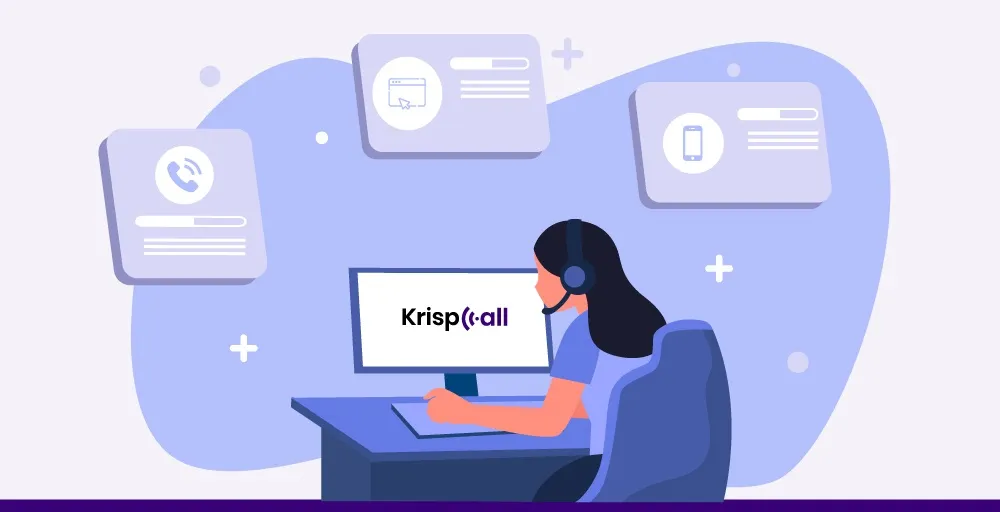
Real-time call analytics are another key strength of KrispCall. They give businesses actionable insights into call performance, customer behavior, and operational efficiency. These insights empower decision-makers to make data-driven adjustments, optimize processes, and ultimately drive better business outcomes.
CRM integration is another highlight of KrispCall. It allows businesses to use customer data and insights from their CRM systems directly within the CCaaS platform. This integration enables agents to access relevant customer information during interactions, personalize engagements, and build stronger customer relationships.
Wrapping Up
In conclusion, selecting the right CCaaS (customer contact as a service) platform involves thoroughly assessing your business needs, evaluating essential features, and considering scalability, security, user experience, integration capabilities, supplier reputation, and cost structure. By defining clear requirements and prioritizing these factors, you can ensure a smooth implementation process, optimal operational efficiency, and enhanced customer satisfaction.💫
A well-chosen platform can transform your customer experience, streamline your contact center operations, and contribute significantly to your overall business success.
KrispCall is a standout option for businesses looking to improve customer contact management because of its feature-rich CCaaS platform, which offers scalability, strong security, seamless integrations, advanced cloud-telephony features, and an intuitive user experience.
FAQs
Why do contact centers use CCaaS (customer contact as a service)?
Contact centers use CCaaS (Customer Contact as a Service) for scalability, flexibility, cost savings, omnichannel support, advanced features, remote work capabilities, integration with other systems, and compliance with regulations.
Is a cloud-based contact center solution suitable for your business?
Yes, a cloud-based contact center solution may be suitable for your business. It offers the ability to scale operations easily, adapt to changing business needs, and lower infrastructure costs than traditional on-premises systems.
How can CCaaS platforms improve customer experiences?
CCaaS platforms can improve customer experiences by allowing personalized interactions, faster response times, easier transitions across communication channels, access to customer data for greater insights, and effective administration of customer questions and concerns..
Can CCaaS platforms integrate with other business applications?
Yes, most CCaaS platforms offer integration capabilities with popular CRM systems, helpdesk software, marketing automation tools, and other business applications to streamline workflows and data sharing.
What are some common challenges in implementing a CCaaS platform?
Some common challenges in implementing a CCaaS platform are as follows:
- Data migration issues
- Training and adoption hurdles for employees
- Providing seamless integration with existing systems
- Managing multiple communication channels effectively
- Maintaining regulatory compliance

